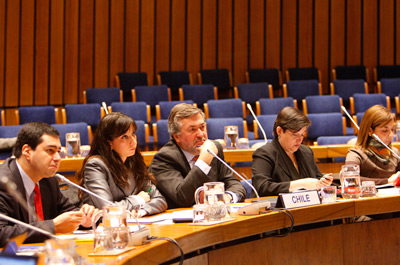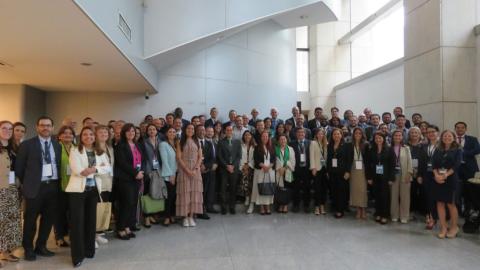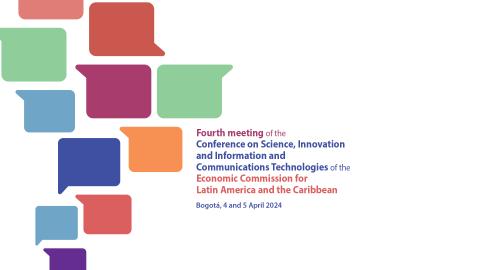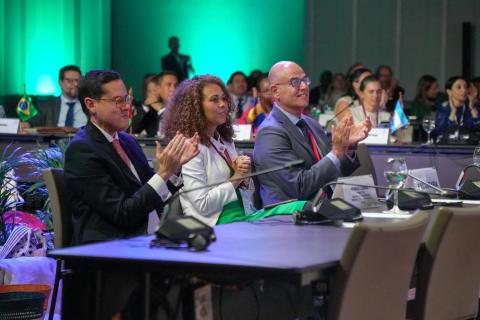News
(26 May 2011) "The Observatory will be an important source of information for the design and monitoring of public policies aimed at universalizing broadband" - these were the worlds of the Executive Secretary of the Economic Commission for Latin America and the Caribbean (ECLAC), Alicia Bárcena, speaking today at the ECLAC headquarters in Santiago, Chile, as she opened the third meeting of the Regional Dialogue on the Costs of International Connections and their Impact on Broadband Prices.
Mobile broadband has been one of the fastest growing telecommunications services in Latin America and the Caribbean in recent years, thanks to its wide availability and the rise in the number of payment options and contracts for users.
However, such growth has been uneven, and this results in a wide gap between the region's countries and more developed nations.
According to data from the Regional Broadband Observatory (ORBA), which was launched today, the percentage of the Latin American and Caribbean population who have mobile broadband services went from 0.2% in 2005 to 4.7% in 2009, while in member countries of the Organisation for Economic Co-operation and Development (OECD), the proportion rose from 5% to 49% in the same period.
According to Ms. Bárcena "ECLAC promotes a development agenda based on equal rights and the narrowing of productive gaps, and the Observatory helps us to see more clearly the inequalities of broadband access, in terms of charges and speed, as well as challenges in relation to infrastructure and connectivity".
The most senior representative of this regional commission of the United Nations also underlined that broadband may "become a fundamental axis for regional integration", especially in the context of the Union of South American Nations (UNASUR).
One of the main factors that determine the take-up of broadband is its price, according to the Executive Secretary of ECLAC, which acts as the technical secretariat for this Regional Dialogue that brings together 10 of the region's countries.
In March 2011, the average regional price for fixed broadband was 72.8 dollars per megabyte per second (mbps), compared with 5.9 dollars per mbps in OECD countries (making the former 50 times more expensive than the latter).
At one extreme, in Bolivia the charge (measured by Purchasing Power Parity) was 300 dollars per mbps, while at the other extreme in Panama the charge is 17.7 dollars per mbps.
Another aspect of broadband quality is speed. Observatory figures show that, over the past year, the effective upload and download speeds for Internet broadband in South America rose by 53%.
This is particularly true for Chile, where in April upload speeds reached 1,767 mbps (39% more than in April 2010) and download speeds reached 6,413 mbps. In Bolivia, upload speeds were 210 mbps and download speeds 428 mbps (which represent the lowest figures in the region).
The Regional Dialogue on broadband was set up in 2010 and involves Argentina, Brazil, the Plurinational State of Bolivia, Chile, Colombia, Costa Rica, Ecuador, Paraguay, Peru and Uruguay.
The third meeting was attended by ministers, vice-ministers and other representatives from national telecommunications sectors who came together to analyse policy options for broadband development, as well as regional integration options for broadband infrastructure.
The session included presentations by Juan Navas-Sabater, Regional Coordinator for Latin America and the Caribbean from the Global ICT Department of the World Bank, and Joaquín Osa, Director-General of the Spanish Telecommunications Market Commission.
ECLAC was given the mandate to set up the Regional Broadband Observatory, which is part of a project funded jointly with the European Union (ECLAC-@LIS2/Programme @LIS2), during the second meeting of the Dialogue held on 20 November 2010 in Lima.
Any queries should be addressed to the ECLAC Public Information and Web Services Section.
E-mail: dpisantiago@cepal.org; Tel.: (56 2) 210 2040.
Follow us on: Twitter , Facebook , Flickr and YouTube .



